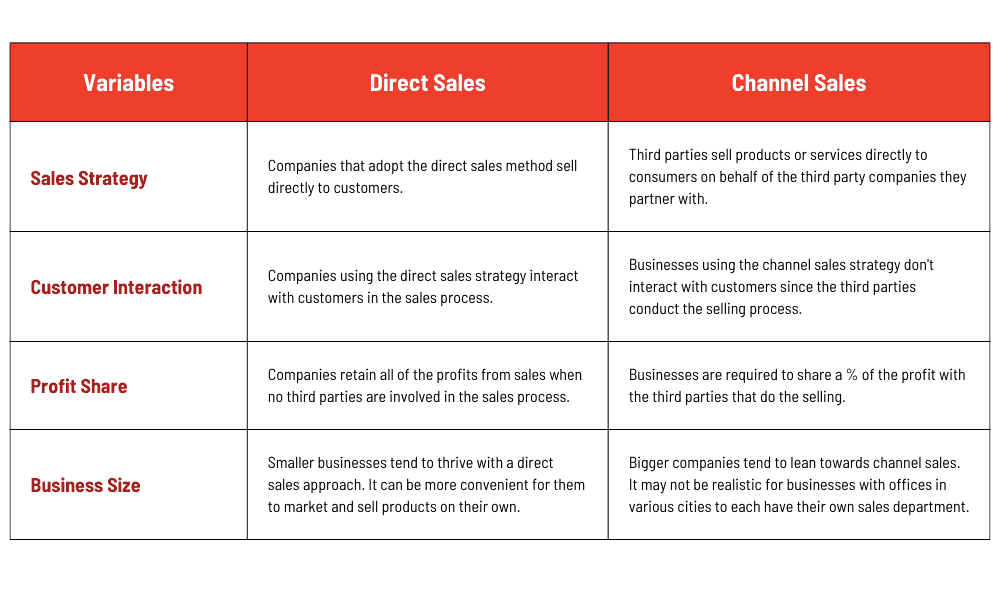

Building an in-house sales team from scratch is resource intensive. Implementing a full sales development team can start at $600,000 annually. This statistic includes a chief marketing officer, digital advertising specialist, data analyst, copywriter, digital marketing specialist, and three sales development representatives. However, the costs associated with seeking, hiring, and onboarding are extra.
Since building an in-house sales team is difficult, some businesses pursue a different strategy—channel sales. It’s where companies partner with third parties that sell products and services for these companies.
For those curious about the core differences between channel and direct sales, think no more because we’re here to give you all the insight you need. Here’s what we’ll cover throughout this blog:
Definition of Channel Sales
Channel sales is a strategy where companies use third parties to sell their products and services. Channel sales is essentially B2B sales outsourcing. The channel sales model is also called the indirect selling model since businesses using it don’t have direct contact with the end users.
Research suggests that channel sales account for 75% of the world’s commerce. So, it goes without saying that it’s the preferred sales strategy option for most businesses worldwide. Channel sales strategies take different forms, including:
- Affiliates: Affiliates earn commissions when they successfully direct people to businesses’ online storefronts. For instance, productivity software companies might hire bloggers or journalists as affiliates to promote the newest versions of their software.
- Distributors: Distributors purchase products directly from businesses and sell the products to consumers. One example of this is a baked goods company that sells directly to a distributor that then sells the baked goods to stores in its target geographic region.
- Resellers: Resellers buy existing products and then resell them. They usually package the products with more features to boost the value proposition for consumers. It’s common for software firms to ink agreements with resellers.
Definition of Direct Sales
Direct sales is when companies sell their products or services directly to consumers—online, offline, or both—rather than through third-party entities. An example of a direct sale model is an airline selling its products directly to its target market . The types of direct sales include:
- Single-level sales: Businesses with a single-level sales approach engage in one-on-one dialogue with customers about products or services. It can be done in person or online.
- Multi-level sales: Companies that use the multi-level sales method have sales reps who sell products or services to customers or business partners. The sales rep can do this by getting catalogs or leveraging social media.
Differences Between Channel Sales and Direct Sales
Most sales are conducted under the channel sales model, but how do channel sales and direct sales compare to each other?

Pros and Cons of Using a Channel Sales Strategy
If you’re considering channel sales lead generation, you’ll want to weigh the pros and cons. Here are the advantages and disadvantages of this sales strategy.
Channel Sales Strategy: Advantages
Efficient Scaling: Have you built up a channel sales model including co-marketing, revenue sharing, and other measures? If so, you’ll easily be able to scale by bringing aboard more channel partners. A single partner manager can oversee numerous partnerships, leading to more revenue that would otherwise require creating an in-house sales team.
Reduce Expenses for Sales, Marketing, and Distribution: By using the channel sales option, you can piggyback off the success of the channel partners you sign on with. The channel partners have already built a presence, nurtured relationships with local consumers, and established their brands. So, you can use this to your advantage.
Lower Expenses to Enter New Markets: Do you want to find a way to break into new markets without incurring the high costs associated with doing so? You can achieve your objectives by teaming up with a channel partner. Working with a third party already in the market you want to enter will be cheaper than your business setting up a presence there.
Our channel sales and B2B lead gen services empower companies to get the most out of their business growth efforts. For more insight into what makes Abstrakt different from other outsourced sales and marketing firms, read our blog here.
Channel Sales Strategy: Disadvantages
Revenue is Less Predictable: Channel partners control the sales process and might not share all of their sales pipelines with your business. Your company will have a less predictable revenue stream.
Reduced Sales-Process Control: Using channel partners means ceding control to third parties. Depending on the channel partners you work with, you might not have any involvement in the sales process.
Revenue Sharing: Your business can expect to share as much as half of the revenues generated by the channel partners that help sell your products.
Pros and Cons of Using a Direct Sales Strategy
If you’re considering direct sales lead generation, you’ll want to weigh the pros and cons. Consider the advantages and disadvantages of this sales strategy method below:
Direct Sales Strategy: Advantages
Keep All the Revenue: Your business can keep all the revenue by using the direct sales method. There’ll be no need to split the revenue with third parties.
Control the Entire Sales Process: Your company will have full control over the sales process since no channel partners will be included in the sales process.
Have Contact With Customers: Another benefit of going the direct sales route is that your business will, by selling directly to consumers, have contact with these customers. You can seek customer feedback on their feelings about the products and services they buy.
Direct Sales Strategy: Disadvantages
Significant Expense: Your business will find assembling an in-house sales team is an expensive proposition that includes finding, onboarding, and paying team members with different skill sets.
Harder to Enter New Markets: Your company will find entering new markets more difficult because it can mean finding a new office, hiring new staff, and pursuing all the other steps associated with expanding in a new market. It can be cost-prohibitive for many businesses.
Hard to Scale: It’s harder to scale a sales department because of the time and money required to find, hire, train, and onboard new staff members.
Abstrakt’s B2B appointment setting solution empowers growing businesses to fill their sales pipelines, scale their business, and generate consistent sales opps. Learn more about our B2B appointment setting service here.
Which Sales Strategy Is Best for My Business?
When looking at channel sales vs direct sales, you’ll want to ask yourself, “Which one is best for my company?” There is no one-size-fits-all answer. You’ll want to consider things like your business model, product or service offering, and target demographic.
Consider the following questions to determine whether to go with a channel sales strategy or a direct sales strategy:
Do you need prompt feedback from customers?
Going the direct sales route might be your best strategy if you want immediate client feedback. You’ll be actively engaged with customers, so you’ll be able to get feedback on their likes, dislikes, and suggestions immediately.
Do you run a small business and don’t need to scale?
The direct sales strategy is a safe bet if you run a small operation and don’t plan to scale. Scaling under the direct sales strategy will be cost-prohibitive since you’ll need to set up another office in whatever new market you want to enter. You’ll also need to worry about staffing it. But if you don’t need to scale and access new markets, direct sales is a good option.
Are you looking to scale your business?
If you want to scale by expanding your business and seeking out new markets, a channel sales strategy can help. A third party will ensure you don’t have to incur the costs associated with setting up a new office and staffing it with a sales team.
Do you want to contain costs?
As has been mentioned, it’s costly to build an in-house sales department. If your business doesn’t have the resources to hire a sales team, signing on with a channel partner is a good idea. Your business will get the help it needs at a lower cost than doing sales in-house.
Ask yourself these four questions to make an informed choice on which sales model makes the most sense for your business. But remember that you don’t have to go with one or the other. If it makes sense for your business, you can use both sales models.
Key Takeaways
When choosing between direct or channel sales, remember that it doesn’t have to be either or. It can be both. But even if you use both, one or the other will probably be especially useful to your business. Channel sales account for most of the global commerce. Depending on your business’s needs, you may or may not be part of the majority favoring channel sales.
If you’re looking to maximize your sales lead generation strategy, look no further. At Abstrakt, our high-converting lead generation services will take your sales strategy to the next level. And no matter what sales strategy you select, we have a solution that provides tangible results you can count on.
When you’re ready to optimize the way you approach sales development, contact the lead generation experts at Abstrakt to get started.




